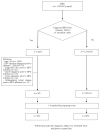Human Papillomavirus and Risk of Colorectal Cancer: An Analysis of Nationwide Claims Data
- PMID: 36295621
- PMCID: PMC9610003
- DOI: 10.3390/medicina58101461
Human Papillomavirus and Risk of Colorectal Cancer: An Analysis of Nationwide Claims Data
Abstract
Background and Objectives: Although human papillomavirus (HPV) is a major etiology of cervical and anogenital cancers, whether it is associated with colorectal carcinogenesis is yet undetermined. Materials and Methods: The longitudinal association of HPV infection with colorectal cancer (CRC) was evaluated using 2000-2013 data from a nationwide Taiwanese claims database. In this retrospective cohort study, 358 patients with primary HPV diagnoses (HPV-infected cohort) and 1432 patients without such a diagnosis (HPV-uninfected cohort) were recruited between 2000 and 2006. Both cohorts were followed up to identify CRC incidences from 2006 to 2013. Hazard ratios (HRs) and their 95% confidence intervals (CIs) derived from Cox proportional hazards models were used to estimate the association between HPV and CRC risk. Results: The HPV-infected cohort had a significantly higher cumulative incidence of CRC than the HPV-uninfected cohort. The presence of HPV was associated with an increased risk of CRC (adjusted HR, 1.63; 95% CI, 1.02-3.62). Furthermore, the significant HPV-CRC risk association was evident in both sexes. Conclusions: This population-based cohort study reveals longitudinal evidence that HPV is associated with an increased risk of CRC. Further studies are required to verify the role of HPV in colorectal carcinogenesis.
Keywords: cohort study; colorectal cancer; human papillomavirus; medical claims dataset.
Conflict of interest statement
The authors declare that they have no potential conflicts of interest.
Figures
References
MeSH terms
LinkOut - more resources
Full Text Sources
Medical



